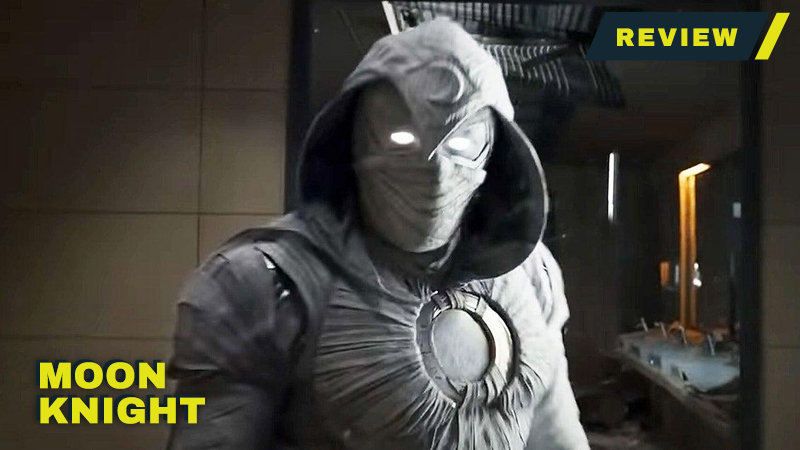The newest outing in the Marvel Cinematic Universe begins with the hands of Arthur Harrow (Ethan Hawke) filling a glass with water and taking a sip before smashing the glass, filling his shoes with the shards, and taking an uncomfortable walk. If that doesn’t do a marvelous job setting the tone for the new Disney+ psychological miniseries Moon Knight, I don’t know what would. “The Goldfish Problem” is an excellent series premiere filled with burning questions and a gripping performance from our lead.
RELATED: Moon Knight Stands Alone in the MCU, Which Is a Good Thing
We are first introduced to Steven Grant (Oscar Isaac) in his bed, ankle chained to the bedpost. He has a one-finned goldfish named Gus and wakes up every morning feeling like he had been hit by a bus. Isaac’s portrayal of Grant is fascinating, donning a British accent to sound entirely different. He brings every bit of his charm to his portrayal of a museum worker knowledgeable about Egypt who fancies himself a tour guide. While establishing the character, writer Jeremy Slater (The Umbrella Academy, The Exorcist) also builds a lot of intrigue surrounding the story.
The difference between this and other MCU miniseries is that ever since WandaVision began the tradition of the Disney+ Marvel shows, this is their first time introducing a brand new character into the universe. As a result, this premiere does not rely on an audience’s previous knowledge of the inner workings of Marvel’s canon to get attached to the content. Instead, this show kicks into high gear with an original, mysterious story, as Grant suddenly wakes up in a field with a dislocated jaw and is chased by armed men trying to kill him.
The episode then formally introduces us to Harrow, a cult leader who wants a scarab that Grant has. Grant tries to hand Harrow the scarab, but a voice in his head prevents him from doing so in a scene that Isaac sells perfectly with a lot of physical comedy. After Harrow blacks out and finds that he has murdered the henchmen, he escapes in a car chase with a strange needle drop. Unfortunately, the use of “Wake Me Up Before You Go-Go” by Wham! does not fit the scene well, and the car chase may have matched the more intense tone of the series without the song’s inclusion.
After Grant wakes up from the events that appeared to be a dream, he realizes Gus now has two fins instead of one. As Grant sits at a steak restaurant waiting for his date, he discovers that two days have passed and he had missed it. Mohamed Diab directs the scene very well, framing it in one long take that allows Isaac to showcase a gripping dramatic performance. The scene expertly captures Grant’s discontent with his disassociative identity disorder, and the moments of human drama beautifully ground his character.
Grant makes some discoveries in his house, as lights begin to flicker and he sees visions. During this sequence, Diab fully leans into the psychological horror genre with the perfect use of a handheld camera to add intensity to the scene and capture Grant’s panic. Harrow reveals he is a servant of the goddess Ammit and sends a monster after Grant. Grant’s reflection speaks to him as an alternate identity, Marc Spector, who gets Grant to relinquish control of his body. Marc kills the monster in his white Moon Knight costume, ending one of the strongest series premieres of MCU history.
RELATED: Moon Knight Episode 1 Leans into Mystery and Offers an Engaging Start
Marvel has used their Disney+ miniseries to experiment with multiple genres, taking the franchise away from the standard action blockbuster and playing around with many different things. This episode begins a fascinating experiment with psychological mysteries and a unique premise. Its mysterious narrative poses many questions to keep viewers begging for more. However, unlike The Book of Boba Fett, this show does not rely on your preexisting enjoyment and knowledge of a franchise to keep you watching. Instead, the premiere of Moon Knight is a wonderfully perplexing thriller with a horror twist.
SCORE: 8/10
As ComingSoon’s review policy explains, a score of 8 equates to “Great.” While there are a few minor issues, this score means that the art succeeds at its goal and leaves a memorable impact.










